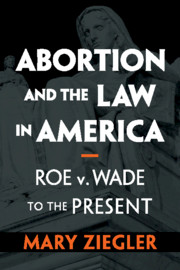Book contents
- Abortion and the Law in America
- Abortion and the Law in America
- Copyright page
- Dedication
- Contents
- Acknowledgments
- Timeline
- Abbreviations
- Introduction
- 1 Roe v. Wade and the Rise of Rights Arguments
- 2 The Hyde Amendment and Its Aftermath
- 3 Launching a Quest to Reverse Roe
- 4 Planned Parenthood v. Casey, the Family, and Equal Citizenship
- 5 Contesting the Relationship between Abortion and Health Care
- 6 Partial-Birth Abortion and Who Decides the Costs and Benefits
- 7 Polarization, Religious Liberty, and the War on Women
- Conclusion
- Notes
- Index
7 - Polarization, Religious Liberty, and the War on Women
Published online by Cambridge University Press: 28 February 2020
- Abortion and the Law in America
- Abortion and the Law in America
- Copyright page
- Dedication
- Contents
- Acknowledgments
- Timeline
- Abbreviations
- Introduction
- 1 Roe v. Wade and the Rise of Rights Arguments
- 2 The Hyde Amendment and Its Aftermath
- 3 Launching a Quest to Reverse Roe
- 4 Planned Parenthood v. Casey, the Family, and Equal Citizenship
- 5 Contesting the Relationship between Abortion and Health Care
- 6 Partial-Birth Abortion and Who Decides the Costs and Benefits
- 7 Polarization, Religious Liberty, and the War on Women
- Conclusion
- Notes
- Index
Summary
Bringing the story up to the present, Chapter 7 considers how the breach between the two sides widened during battles about religious liberty and health care reform. In 2010, a backlash to President Barack Obama’s health care reform, the Affordable Care Act (ACA), helped to give Republican lawmakers control of most state legislatures. These members of the so-called Tea Party passed an unprecedented number of abortion restrictions. Pro-lifers also joined an attack on the contraceptive mandate of the ACA, arguing that the government had denigrated religious liberty. While pro-lifers accused Planned Parenthood of illegal and immoral actions, abortion-rights supporters described their opponents as misogynist opponents of health care and birth control. In 2016, in Whole Woman’s Health v. Hellerstedt, the Court made claims about the costs and benefits of abortion yet more central to constitutional doctrine. With the retirement of Justice Anthony Kennedy two years later, many expected the Court to overturn Roe. But rather than seeking to appeal to ambivalent voters, antiabortion absolutists pushed strict abortion bans. For their part, abortion-rights supporters tried to expand abortion rights in the states. Decades of debate about the policy costs and benefits of abortion had pushed the two sides even further apart.
Keywords
- Type
- Chapter
- Information
- Abortion and the Law in AmericaRoe v. Wade to the Present, pp. 181 - 206Publisher: Cambridge University PressPrint publication year: 2020

